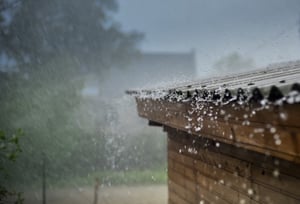Are Metal Roofs Noisy When it Rains or Hails?
One of the most frequent questions homeowners ask about metal roofs is whether it will be noisy when it rains and hails. And indeed, given the long life span of metal roofing (50+ years), it's a valid concern.
Noise Levels
Decibels (dBA) measure the intensity of sound. A whisper is about 30 dBA, normal conversation is around 60 dBA, and a lawnmower is about 90 dBA.
 According to the Acoustic Group at the University of Lulea, Sweden, rain on asphalt shingles is about 46 dBA compared to rain on a metal roof at 52 dBA. So, what does that mean? Since most humans can’t distinguish between sounds less than eight decibels apart, the noise difference between metal and shingle roofs is undetectable.
According to the Acoustic Group at the University of Lulea, Sweden, rain on asphalt shingles is about 46 dBA compared to rain on a metal roof at 52 dBA. So, what does that mean? Since most humans can’t distinguish between sounds less than eight decibels apart, the noise difference between metal and shingle roofs is undetectable.
So, the short answer is, no, they aren't any noisier than other types of roofing.
 Construction Matters
Construction Matters
Surprised? You aren't alone. The confusion stems from the construction of the roof. Modern residential metal roofing systems are constructed with multiple layers, which can help reduce noise.
Roof Decking: is the structural surface that roofing products are attached to. Depending on where your decking lies, and which type of deck you use can influence everything from the sound your roof makes during rainfall, to the amount of thermal insulation you have, to the overall feeling of the durability of your roofing system. A strong sheathing, such as plywood or OSB (Oriented Strand Board), serves as a solid platform that can reduce the sound.
Insulation: serves as a sound barrier, absorbing and dampening external noise while also helping to regulate temperature. This reduces the expansion and contraction of metal panels, which can cause noise.
Underlayments: are materials like synthetic felt or rubberized asphalt that can not only provide an extra layer of thermal protection but also help muffle sound. They create a buffer between the metal roof and the structural components.
Roofs installed on less-substantial buildings, such as barns, sheds, gazebos, etc, that lack solid decking and insulation, will likely be a bit louder. This is because when rain and hail strike a solid metal surface, there is nothing to dampen the sound. But as soon as those building components are added, noise levels return to what could be generally expected with any other roofing material.
Advanced Noise Reduction Techniques
Some metal manufacturers have created systems allowing metal panels to be installed over existing shingles. In these applications, the existing shingles also serve as an additional insulator and even further reduce the noise many homeowners falsely associate with "all" metal roofing.
And, of course, increasing insulation in the attic airspace provides a double benefit for shingle and metal roofing. Adding more insulation typically saves energy and keeps the home’s interior quieter.
Learn more about how metal roofing performs in extreme weather.
About McElroy Metal
Since 1963, McElroy Metal has served the construction industry with quality products and excellent customer service. The employee-owned components manufacturer is headquartered in Bossier City, La., and has 14 manufacturing facilities across the United States. Quality, service and performance have been the cornerstone of McElroy Metal’s business philosophy and have contributed to the success of the company through the years. As a preferred service provider, these values will continue to be at the forefront of McElroy Metal’s model along with a strong focus on the customer.









Comments on this article:
Scroll down to the bottom to submit a comment and join the conversation. Need help or have a question? Please contact us. Looking for a distributor or contractor? Please click here to get started.